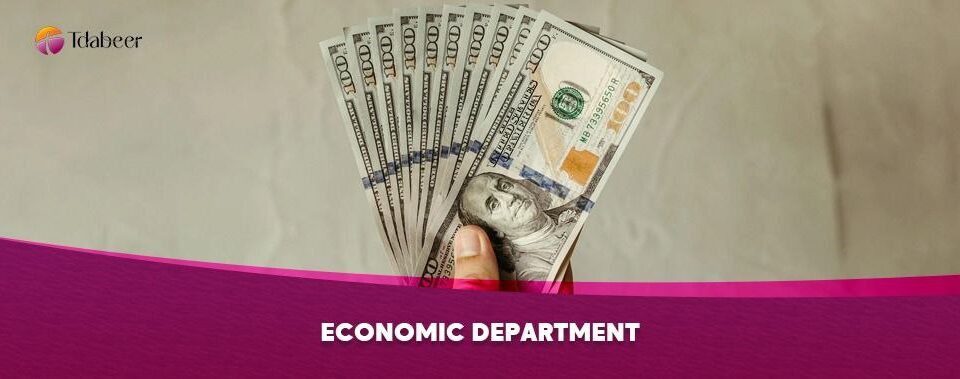
An Economic Department plays a crucial role in shaping a nation’s financial and economic landscape. Whether within a government, international organization, or private institution, these departments provide essential research, develop policies, and advise on economic strategies. This guide will delve into the various roles, functions, and importance of an economic department, highlighting its critical position in supporting sustainable development.
What is an Economic Department?
An Economic Department is an entity within governments or institutions tasked with analyzing, managing, and advising on economic policies and strategies. Its main responsibility is to oversee the economy’s performance, monitor economic trends, and develop measures to promote financial stability and growth.
Key Roles of the Economic Department
Economic Policy Development
One of the main roles of an economic department is to develop and propose economic policies that promote growth, reduce unemployment, control inflation, and ensure fiscal stability. These policies impact industries, trade, employment, and public services.
Research and Analysis
Economic departments conduct in-depth research on various economic issues, from inflation trends to trade deficits. They analyze data to understand economic conditions and predict future economic scenarios.
Budget and Financial Management
Economic departments also play a significant role in managing a country’s or organization’s budget. They help in formulating annual budgets, allocating resources, and ensuring financial policies align with overall economic goals.
Functions of the Economic Department
Data Collection and Reporting
To make informed decisions, economic departments gather and analyze vast amounts of data, including financial reports, employment statistics, and international trade data. This information is crucial for crafting economic policies and strategies.
Economic Forecasting
Forecasting economic trends, such as GDP growth or unemployment rates, is another essential function. These forecasts help governments and businesses plan for the future, ensuring they are prepared for potential economic challenges or opportunities.
Advising Government and Businesses
Economic departments provide crucial advice to policymakers, business leaders, and investors. Their insights shape everything from government spending to corporate investment decisions.
Importance of the Economic Department
Shaping National Economic Policy
Economic departments are at the heart of developing policies that regulate trade, taxation, and public spending. Without their guidance, governments would struggle to maintain economic stability or promote growth.
Ensuring Sustainable Economic Growth
The economic department helps ensure that economic growth is sustainable and inclusive, benefiting all sectors of society. Their focus on long-term economic planning ensures that resources are managed wisely for future generations.
Managing Public Resources
Governments rely on economic departments to help them manage public funds and resources efficiently. This includes overseeing public sector budgets, ensuring that taxpayer money is used effectively, and reducing wasteful spending.
Subdivisions Within the Economic Department
Macroeconomics Division
This division focuses on large-scale economic factors such as national GDP, inflation, and overall economic growth. They analyze trends in the global economy and how they impact the national level.
Microeconomics Division
Focusing on individual industries and sectors, the microeconomics division looks at the effects of economic policies on businesses, consumers, and labor markets.
Public Finance Division
The public finance division handles taxation, government spending, and public sector debt. It plays a key role in determining how public resources are allocated and used.
Economic Indicators Monitored by the Department
Gross Domestic Product (GDP)
GDP is a primary measure of a country’s economic performance. Economic departments monitor GDP to assess the economy’s health and determine if growth is slowing or accelerating.
Inflation Rates
Tracking inflation helps economic departments keep prices stable and prevent the economy from overheating or entering a deflationary spiral.
Unemployment Rates
High unemployment is a major concern for any economy. The economic department works to analyze trends in joblessness and propose solutions to reduce unemployment.
Challenges Faced by Economic Departments
Global Economic Uncertainty
The global economy is constantly changing, presenting challenges such as trade wars, financial crises, and unexpected shocks (e.g., pandemics). Economic departments must stay adaptable and ready to respond.
Technological Disruptions
Automation, artificial intelligence, and digital currencies are reshaping the economy. Economic departments must understand these technologies and predict how they will impact employment, trade, and production.
Balancing Economic Growth and Environmental Sustainability
Economic departments face the challenge of promoting growth while addressing environmental concerns. Policies must be crafted to support green energy, reduce carbon emissions, and preserve natural resources.
The Role of Economists in the Economic Department
Economists play a critical role in providing the data analysis, forecasts, and reports needed to support decision-making. They use their expertise to understand market trends, economic cycles, and the potential impact of policy changes.
Collaborations and Partnerships
National and International Cooperation
Economic departments often collaborate with other countries, international organizations (e.g., the IMF or World Bank), and NGOs to address global economic challenges like climate change, poverty, and trade imbalances.
Private Sector Engagement
Engaging with the private sector is crucial for understanding the real-time impacts of economic policies on industries and markets. These partnerships foster better economic policies that drive innovation and job creation.
Technologies and Tools Used in the Economic Department
Data Analytics and Forecasting Tools
Advanced data analytics tools allow economic departments to forecast economic trends more accurately and make informed decisions. Machine learning and big data are revolutionizing how economists analyze complex economic data.
Economic Modeling Software
Software like STATA, EViews, and MATLAB helps economists simulate economic scenarios and measure the effects of various policies on national and global economies.
Case Studies: Successful Economic Policies by Economic Departments
We can look at examples such as how economic departments managed fiscal policies during financial crises, like the 2008 global recession or the COVID-19 pandemic, to learn how they adapt and innovate in challenging times.
How Economic Departments Support Businesses and Investors
Economic departments provide businesses with crucial economic forecasts, helping them make informed investment decisions. They also shape policies that create favorable environments for business growth and foreign investment.
The Impact of Globalization on the Economic Department’s Work
Globalization has expanded the role of economic departments, as they now must consider international trade dynamics, currency fluctuations, and global supply chains when crafting economic policies.
in Conclusion The economic department is vital to the success of any nation or organization, helping to guide economic policy, manage public resources, and foster sustainable growth. As the global economy continues to evolve, the role of economic departments will become increasingly important in shaping a prosperous future.






